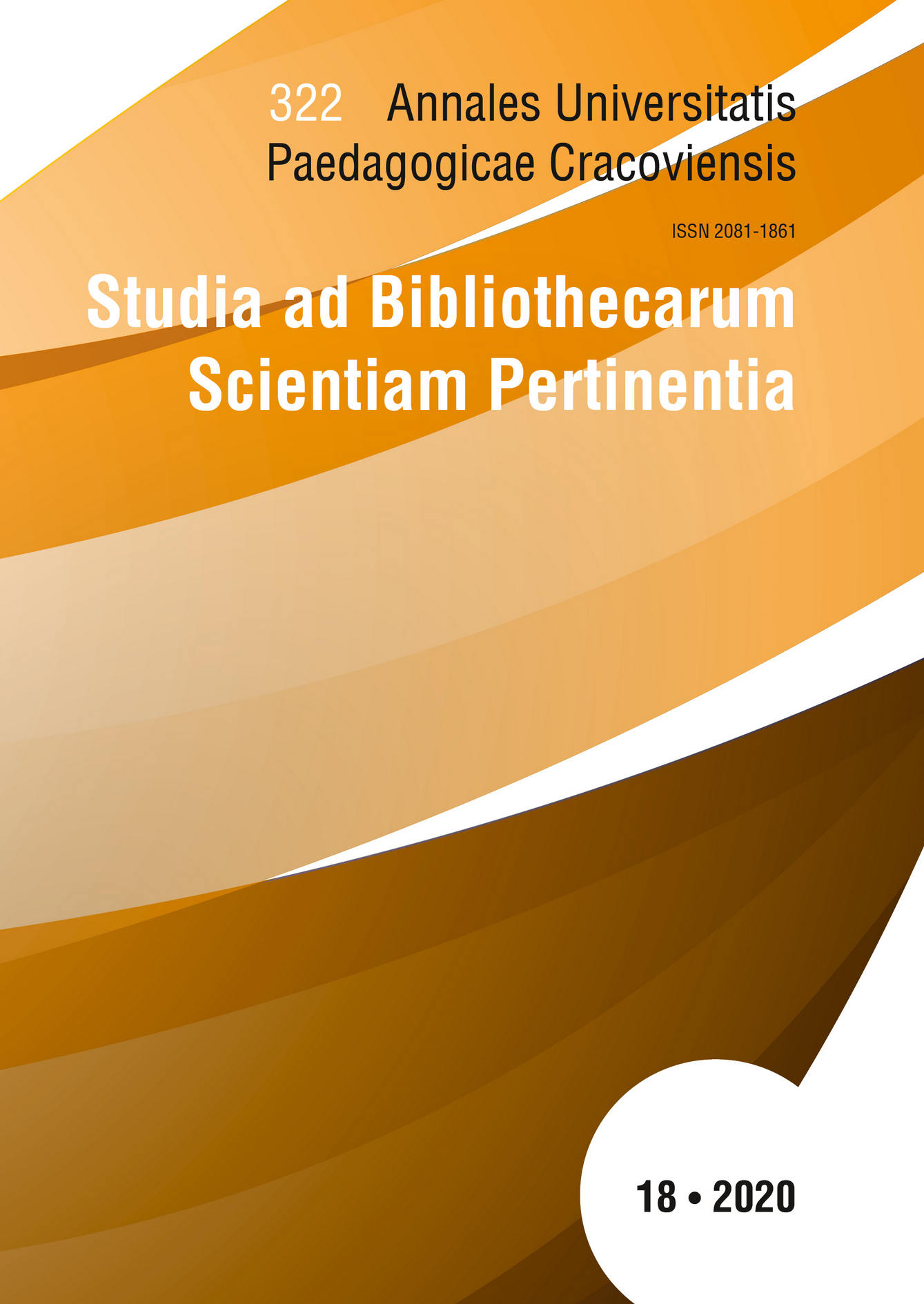Biblioteki w szkołach autonomicznej Galicji
DOI:
https://doi.org/10.24917/20811861.18.3Słowa kluczowe:
Galicia; folk schools; high schools; district libraries; reading roomsAbstrakt
During the period of autonomy, the network of libraries in popular schools was still not very dense. There were schools without libraries or with only a few publications. The situation in secondary schools was much better. Virtually all of them had libraries with two departments for teachers and students. They also had relatively large and numerous collections. Funds for the purchase of books were received by folk and secondary schools from the National School Council, or they increased their book collections as a result of donations from various institutions or private individuals. In addition to libraries operating at schools, libraries in districts were also organised, which could only be used by teachers of folk schools and were supervised by district school councils. All libraries were aimed at providing factual knowledge to teachers and students. Teachers of secondary schools used libraries to a greater extent than teachers of folk schools. This problem was noticed by the National School Council. Regardless of the large number of collections, libraries were often students only contact with books. A properly selected and assembled collection of books had an effective influence on students’ ideological attitudes and social behaviour. In the process of raising the intellectual level of students and their upbringing in secondary schools, the Dragon (a reading room) played a clear role. The reading room’s purpose was to supplement and expand the knowledge acquired in the school lesson process and satisfy students’ individual interests and skills. In terms of upbringing, the reading room was a place for organising evenings, mornings, anniversaries of historical figures, ceremonies of state (court) holidays, poetry readings, and songs, that is, organising the social life of students. For young people, the room performed a cultural function within which national values started to dominate over time. It prepared them to function in adulthood as the social and intellectual elite of the future Second Polish Republic.
Bibliografia
Chrząszcz Cz., Wychowawcy elit. Działalność katechetów galicyjskich szkół średnich w latach 1867-1918, Kraków 2014.
Dybiec J., Mecenat naukowy i oświatowy w Galicji 1860-1918, Wrocław–Warszawa–Kraków–Gdańsk–Łódź 1981.
Falkowska H., Z dziejów polskich bibliotek szkolnych, Warszawa 1966.
Kasprzyk-Machata J., Biblioteki Zachodniej Galicji w służbie oświaty w dobie autonomii galicyjskiej, „Annales Universitatis Paedagogicae Cracoviensis. Studia ad Bibliothecarum Pertinentia IX” 2011, folia 104, s. 22-39.
Szocki J., Biblioteki ludowe w drugiej połowie Galicji XIX wieku: zjawisko kulturowe, ich funkcje oświatowe, [w:] Kraków–Lwów. Książki – czasopisma – biblioteki XIX i XX wieku, red. J. Jarowiecki, t. 4, cz. 1, Kraków 2003, s. 169-180.
Pierożyński K., Ustawy i rozporządzenia w zakresie szkół ludowych, Lwów 1904.
Sawczyński Z., Z lat dziecinnych, „Szkoła” 1884, nr 1, s. 4-5.
Słotwiński J., Czytelnie i koła naukowe młodzieży – ich urządzenie i zadania, [w:] Sprawozdanie z trzeciej konferencji dyrektorów szkół średnich galicyjskich, Lwów 1909, s. 34-42.
Stinia M., Państwowe szkolnictwo gimnazjalne w Krakowie w okresie autonomii galicyjskiej, Kraków 2004.
Wałek B., Czytelnie uczniowskie i kola wnukowe w procesie kształcenia i wychowania uczniów w galicyjskich szkołach średnich (w świetle sprawozdań szkolnych z lat 1904-1917), „Nowa Biblioteka. Technologie Informacyjne i Media” 2016, nr 4 (23), s. 65-90.
Wałek B., Szkolne biblioteki okręgowe w Galicji doby autonomicznej w procesie kształcenia i doskonalenia nauczycieli szkół ludowych, [w:] Kraków–Lwów. Książki, czasopisma, bi-blioteki XIX i XX wieku, red. J. Jarowiecki, t. 5, Kraków 2001.
Wilk D., Biblioteki polskie we Lwowie w dobie autonomii galicyjskiej (komunikat), [on-line:] http://rep.up.krakow.pl – 3.12.2020.
Pobrania
Opublikowane
Jak cytować
Numer
Dział
Licencja
Prawa autorskie (c) 2020 Annales Universitatis Paedagogicae Cracoviensis | Studia ad Bibliothecarum Scientiam Pertinentia

Utwór dostępny jest na licencji Creative Commons Uznanie autorstwa – Użycie niekomercyjne – Bez utworów zależnych 4.0 Międzynarodowe.

